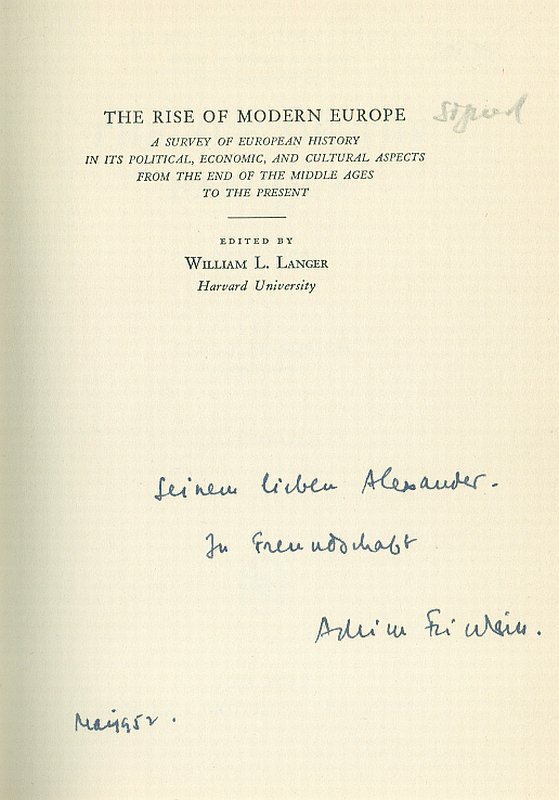Friedrich, The Age of the Baroque. 1610-1660.
The Age of the Baroque. 1610-1660. The Rise of Modern Europe. A Survey of European History in its Political, Economic, and Cultural Aspects From the End of the Middle Ages to the Present.
First edition. New York, Harper & Brothers, 1952. 15 x 22 cm. 367 pages. Original Hardcover in protective Mylar. Very good condition with minor signs of usage. Inscribed by Carl J. Friedrich on the front free endpaper / Mit handschriftlicher Widmung von Friedrich auf dem fliegenden Vorsatz: ‘Meinem lieben Alexander in Freundschaft – Achim Friedrich’ With few clean markings inside. [The Rise of Modern Europe – Edited by William L. Langer]
Contains among others: The Pattern of Politics and Economics; Baroque in Life and Letters; baroque in Arts and Music; Religion, Philosophy and the Sciences; The Sultry Years of Precarious Balance: The Dutch Ascendancy etc. etc.
Carl Joachim Friedrich (born June 5, 1901, Leipzig, German Empire – September 19, 1984, Lexington, Massachusetts) was a German-American professor and political theorist.
His writings on law and constitutionalism made him one of the world’s leading political scientists in the post-World War II period. He is one of the most influential scholars of totalitarianism.
Friedrich, who was arguably the most knowledgeable scholar in his field (of German Constitutional history) of his time, was endowed with a healthy self-regard. Indeed, some of his colleagues at Harvard regarded him as a “somewhat hybristic person who was overly confident of his own abilities.”[1]
Friedrich was the author of an article “Poison in Our System” for the June 1941 issue of the Atlantic Monthly, criticizing Songs For John Doe, an album of songs against Roosevelt’s peacetime draft (issued in May 1941, before Hitler’s Germany had declared war on the United States), by the Almanac Singers, who included the then twenty-one-year-old Pete Seeger, performing under the pseudonym ‘Pete Bowers’. Friedrich was apparently as alarmed by the potential for uncontrolled spread of such topical songs as he was by their (fairly innocuous by current standards) content, and opined that “mere” legal suppression would be an inadequate antidote, calling for the establishment of civilian pressure groups to take cultural countermeasures:
These recordings are distributed under the innocuous appeal: “Sing out for Peace”. Yet they are strictly subversive and illegal. . . The three records sell for one dollar and you are asked to “play them in your home, play them in your union hall, take them back to your people.” Probably some of these songs fall under the criminal provisions of the Selective Service Act, and to that extent it is a matter for the Attorney-General. But you never can handle situations of this kind democratically by mere suppression. Unless civic groups and individuals will make a determined effort to counteract such appeals by equally effective methods, democratic morale will decline.[2]
From 1946 to 1948, Friedrich served as Constitutional and Governmental Affairs Adviser to the Military Governor of Germany, General Lucius D. Clay. He advised the American military on the denazification of Occupied Germany and participated in work leading to the drafting of the West German Basic Law and the creation of Germany’s States’ constitutions. He later advised on the constitutions of Puerto Rico, the Virgin Islands, and Israel, among others. Between 1955 and 1971, Friedrich was Eaton Professor of the Science of Government at Harvard University and Professor of Political Science at the University of Heidelberg from 1956 to 1966.
He taught alternately at Harvard and Heidelberg until his retirement in 1971. He later taught at the University of Manchester and Duke University, among others. He also served as president of the American Political Science Association in 1962 and of the International Political Science Association from 1967-70. In 1967, Friedrich was awarded the Knight Commander’s Cross of the German Order of Merit by the President of the Federal Republic of Germany.
Professor Friedrich’s many students included such noted political theorists as Judith Shklar, Benjamin Barber, and Zbigniew Brzezinski.
Friedrich’s concept of a “good democracy” rejected basic democracy as totalitarian. Some of the assumptions of Friedrich’s theory of totalitarianism, particularly his acceptance of Carl Schmitt’s idea of the “constitutional state”, are viewed as potentially anti-democratic by Hans J. Lietzmann. Schmitt believed that the sovereign is above the law. Klaus von Beyme sees the main focus of Friedrich’s theories as the “creation and preservation of robust institutions”. This can be seen as influencing his work on the creation of Germany’s States’ constitutions. His best guess as to when this might occur was the year 2000. (Wikipedia)
- Keywords: Baroque · Economics · Historical Analysis · History · Political Law · Signed · Signiert · Widmung · Widmungsexemplar
- Language: English
- Inventory Number: 27037AB
EUR 250,--
© 2024 Inanna Rare Books Ltd. | Powered by HESCOM-Software











